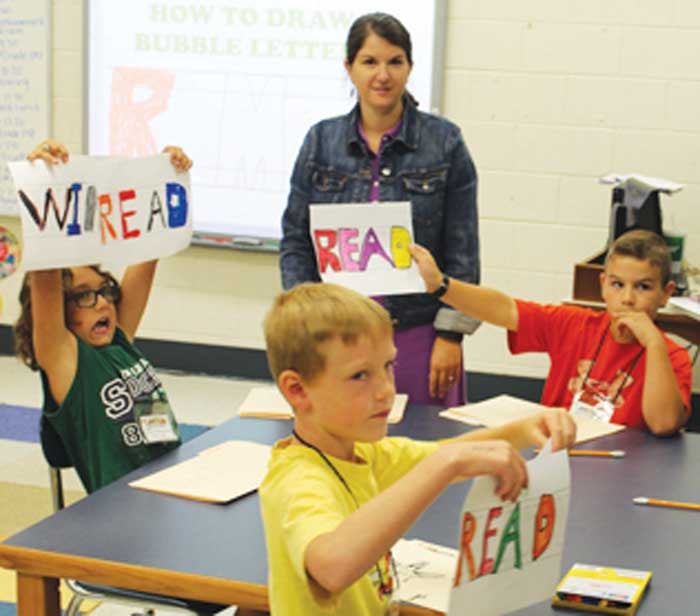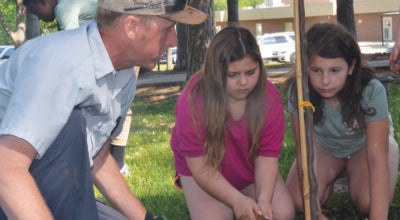Davie students ‘read to achieve’
Published 9:02 am Thursday, July 21, 2016

- Mindy Ledbetter gets the students involved in learning.
They move in unison. Sixty little bodies stretch and bend with the music.
This morning stretch helps prepare the attendees of Davie County’s Read to Achieve camp for a day of learning, fun, and success.
Davie County’s Read to Achieve Camp employs a holistic approach to reading. Attendees actively learn through visual arts, dance, drama, music and creative writing, in addition to tailored instruction through Hill Center Reading sessions and small group literacy circles. Campers develop self-confidence and learn techniques to reduce test anxiety.
“Listening has a great deal to do with reading comprehension, and rhythm has a great deal to do with reading fluency,” said Noel Grady-Smith, executive director of curriculum and leadership development for Davie County Schools. “We believe we need to challenge the students with a variety of modalities to enhance each child’s unique way of learning and provide a rich variety of opportunities for reaching mastery.”
The results have been inspiring.
During the summer of 2015, more than 30 percent of Davie’s non-proficient students reached the required reading achievement score to move on to fourth grade. Other campers received extra assistance during the school year with an additional 15 percent of those students passing the Read to Achieve test in the months following camp.
All of the students achieved significant growth in confidence, engagement, and stamina in approaching new learning experiences.
“While a 45 percent success rate for the camp may not seem extraordinary to people not close to education, and more specifically the Read to Achieve program, that rate is far better than those being reported by the majority of school systems in North Carolina,” said Larry Colbourne, president, Mebane Charitable Foundation, which provided $90,000 to support the camp.
There are 120 students from across the county enrolled in this summer’s intensive four-week camp. Sixty-three are third graders who have failed to meet state requirements in reading to advance to the fourth grade. The rest are first and second graders, as mandated this year by the N.C. Department of Public Instruction, who have not yet mastered the proficient level of reading. The first and second graders participating in the camp were identified as close to proficiency, but in need of summer support to prevent losing ground.
“Most of these students have a low perception of themselves as learners,” said Jeremy Brooks, camp director and a sixth grade teacher at North Davie Middle School. “Many of these kids have already taken and haven’t proven proficient on two EOGs and the Read to Achieve test. We try to not even say the word test because it causes stress and and has negative connotations. We take them through a variety of reading activities in a fun environment.
“The structure of the camp creates a lot of excitement. Students aren’t used to singing, dancing, and rapping during a regular school day,” Brooks said.
The camp day begins at 8 a.m. with a short combined session focused on goal setting for the day. Students are divided into small groups with an average ratio of 14 students per teacher except when students are in Hill RAP sessions at the four to one ratio.
The student’s day is divided between Hill Rap sessions, writing to learn sessions, art and reading sessions, testing stamina sessions, music/theatre and verbal expression sessions, and diagnostic reading clinic sessions. Each session lasts approximately 45 minutes. Each day ends at 2:45.
At the end of the fourth week, students will be allowed to retake the RtA Reading test, which is a form of the EOG. A celebration of learning follows the third grade testing. This camp-wide traditional Native American Powwow is a final opportunity for campers to share their new confidence as readers and their understanding of social studies themes of culture, family, and self.
Campers are also benefitting from myOn, a computer-based learning system, which the state is offering free of charge this summer as part of a pilot program.
Raymonda Shelton, the camp’s curriculum coordinator and the instructional coach at William R. Davie Elementary School, has collaborated with the RtA teachers to use the collection of leveled readers to create units that go along with what is being studied in the classroom, allowing students to build background knowledge to take back their literacy circles.
Grady-Smith further attributes the success of the program to the implementation of Hill Center Reading Achievement Program (Hill RAP) sessions and A+ Schools Instruction during the summer program and subsequent school year which creates a consistent foundation for student achievement.
Through Hill RAP, eight specially-trained teachers guide groups of four students through exercises in phonological awareness, phonics, fluency, vocabulary and comprehension. Each student has an individual curriculum to provide instruction where needed most.
A+ Schools combine interdisciplinary teaching and daily arts instruction, offering children opportunities to develop creative, innovative ways of thinking, learning and showing what they know. In A+ Schools, teaching the state’s mandated curriculum involves a collaborative, many-disciplined approach, with the arts continuously woven into every aspect of learning.
The heart of Davie’s RtA camp is its staff of passionate, dedicated educators. Each has been fully trained in the A+ Schools Arts Integrated Instruction program and has personally completed each and every assignment the students complete. In addition, those conducting Hill RAP sessions have at least three years of experience teaching Hill reading methodologies. The Hill RAP teachers completed additional training this year to use the digital learning system that allows students to manage their progress on iPads.
Most are RtA camp veterans who return each year because they are excited about the growth and success students are experiencing, often for the first time.
“Read to Achieve Camp renews my love for teaching,” said Kerry Blackwelder, a reading specialist at Cooleemee Elementary who is teaching Hill Center groups for the third year. “We are able to look at each student, see how they learn, and teach them in a style that best meets their needs.”
“The students usually start out shy. They know the answers, but they are afraid to speak up,” Blackwelder said. “By the end of camp, they have gained confidence and become risk takers. When they come together here, they are one big melting pot. They discover that other students share their struggles, and they learn to love themselves for who they are. A lot of them cry on the last day.”
“Read to Achieve Camp is magical,” she added.
Lauren Rieth, lead visual arts teacher for Davie County Schools and a third year camp veteran who is teaching art, agrees. Although she is approaching retirement, she is determined to continue teaching at the camp.
“When I walk into that classroom I see brilliance. Learning through play brings out their intelligence. Suddenly they are confident and free to be their natural selves. We don’t have any judgements about who they are. We love them for what they bring to the table.”
“So often I see myself in them,” Rieth said. “School never recognized my artistic intelligence or moving intelligence. When students take in information through art and movement it has staying power because they love what they are doing when they hear the information. Their brains turn on.”
“These kids can’t believe it. They are required to go to camp and then they can’t believe how amazing it is.”
Blackwelder and Rieth are two of the camp’s 27 educators from across Davie County that Brooks calls an “All-Star staff.”
Others include: Suzie Alonso, Hill Center (Cornatzer); Ashley Bailey, teacher assistant (William R. Davie); Jane Brooks, Hill Center (South Davie); Kim Brooks, reading coach (Cornatzer); Mary Lynn Bullins, reading coach (Cornatzer); Kilby Church, first grade reading coach (Pinebrook); Christy Cornatzer, Hill Center (Cornatzer); Kim Crotts, second grade reading coach, (Pinebrook); Lori Culler, reading coach (Pinebrook); Leigh Anne Davis, reading coach (Pinebrook); Regina Dzybon, reading coach (Shady Grove); Shannon Eggleston, reading coach, (William R Davie); Suzie Hecht, second grade Hill Center (Mocksville); Angela Lankford, TA first and second grade (Cornatzer); Mindy Ledbetter, art first and second grade, (Davie High); Brenda Mosko, music, (South Davie/William Ellis); Anna Newman, music, (North Davie); Erin Penley, music first and second grade (Pinebrook); Madison Pratapas, A+ student apprentice, graduate of Davie High School; Dana Roberts, art (South Davie); Alma Rosas, Hill Center (William R. Davie); Susan Shepherd, first grade Hill Center (Cornatzer); and Kolleen Sullivan, Hill Center (Shady Grove).
Many of the methods used in the Read to Achieve Camp are designed to be shared throughout the school system by these trained teachers. Schools and students county-wide benefit because these teachers are able to take the new training they receive each summer and their collective ideas and experiences back to their classrooms to share with their students and colleagues.
“After 26 years of teaching, I still learn new things and new methods of teaching,” Blackwelder said. “It gets me excited to start the school year. I wish this is how school could be all year long.”
The camp builds so much more than academic success. Students leave camp believing in themselves and their abilities.
“We provide 16 days of success so that the test is no longer such a big deal and the students have the resilience and confidence to make it through,” Brooks said.





